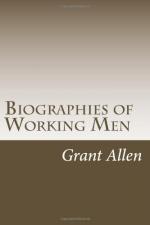By-and-by, when the time came for Francois to choose a trade, he being then a big lad of about nineteen, it was suggested to his father that young Millet might really make a regular painter—that is to say, an artist. In France, the general tastes of the people are far more artistic than with us; and the number of painters who find work for their brushes in Paris is something immensely greater than the number in our own smoky, money-making London. So there was nothing very remarkable, from a French point of view, in the idea of the young peasant turning for a livelihood to the profession of an artist. But Millet’s father was a sober and austere man, a person of great dignity and solemnity, who decided to put his son’s powers to the test in a very regular and critical fashion. He had often watched Francois drawing, and he thought well of the boy’s work. If he had a real talent for painting, a painter he should be; if not, he must take to some other craft, where he would have the chance of making himself a decent livelihood. So he told Francois to prepare a couple of drawings, which he would submit to the judgment of M. Mouchel, a local painter at Cherbourg, the nearest large town, and capital of the department. Francois duly prepared the drawings, and Millet the elder went with his, son to submit them in proper form for M. Mouchel’s opinion. Happily, M. Mouchel had judgment enough to see at a glance that the drawings possessed remarkable merit. “You must be playing me a trick,” he said; “that lad could never have made these drawings.” “I saw him do them with my own eyes,” answered the father warmly. “Then,” said Mouchel, “all I can say is this: he has in him the making of a great painter.” He accepted Millet as his pupil; and the young man set off for Cherbourg accordingly, to study with care and diligence under his new master.
Cherbourg, though not yet at that time a great naval port, as it afterwards became, was a busy harbour and fishing town, where the young artist saw a great deal of a kind of life with which he possessed an immense sympathy. The hard work of the fishermen putting out to sea on stormy evenings, or toiling with their nets ashore after a sleepless night, made a living picture which stamped itself deeply on his receptive mind. A man of the people himself, born to toil and inured to it from babyhood, this constant scene of toiling and struggling humanity touched the deepest chord in his whole nature, so that some of the most beautiful and noble of his early pictures are really reminiscences of his first student days at Cherbourg. But after he had spent a year in Mouchel’s studio, sad news came to him from Gruchy. His father was dying, and Francois was only just in time to see him before he passed away. If the family was to be kept together at all, Francois must return from his easel and palette, and take once more to guiding the plough. With that earnest resolution which never forsook him, Millet decided to accept the inevitable. He went back home once more, and gave up his longings for art in order to till the ground for his fatherless sisters.




